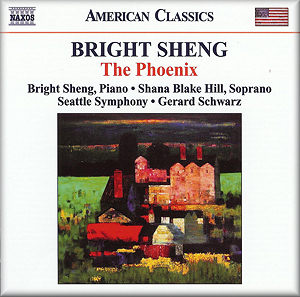 |
 |
|


alternatively
CD: AmazonUK
AmazonUS
Download: Classicsonline
|
Bright SHENG
(b.1955)
Red Silk Dance (1999) [15:13]1
Tibetan Swing (2002) [9:07]
The Phoenix (2004) [23:38]2
H’un (Lacerations): In Memoriam 1966-1976 (1988)
[22:42]
 Bright
Sheng (piano)1, Shana Blake Hill (soprano)2 Bright
Sheng (piano)1, Shana Blake Hill (soprano)2
Seattle Symphony/Gerard Schwarz
rec. 7-8 September 2004 (Tibetan Swing), 28 February and 2 March 2006
(H’un), 23 February 2007 (Red Silk Dance), 13-15 June 2007 (The
Phoenix), S. Mark Taper Foundation Auditorium, Benaroya Hall, Seattle,
Washington
Sung text included.
 NAXOS 8.559610 [70:46]
NAXOS 8.559610 [70:46]  |
|
|
Bright Sheng brings to his music the kind of multi-cultural background that is now common in the modern world - and will surely become even more common. Born in Shanghai, Sheng moved to New York in 1982 and has, for some time, been The Leonard Bernstein Distinguished University Professor at the University of Michigan. In his youth, the Cultural Revolution banished him to the Chinese countryside, in the province of Qinghai, near Tibet (during which exile he took the opportunity to add a familiarity with traditional Chinese instruments to his training in the Western classical tradition).
Red Silk Dance is effectively a single movement piano concerto,
outer sections lively and percussive, even raucous, the quieter
central section featuring a treatment for piano of an Asian
melody for flute, supported by muted strings. Cheng apparently
had in mind the Silk Road and its role in religious, cultural
and mercantile exchanges. I’m not sure that I can hear
quite such a specific reference in the music, though it is
fair to say that the music enacts the interchange of musical
idioms, with echoes of Chinese music, the music of the middle
east, Bartok, and more; the results are engaging and vivid,
if not especially profound.
The title of Tibetan Swing refers, not to Fats Waller or Count Basie, but to the way in which the dresses of Tibetan women move in their dancing. The rhythms are insistent and - like those of Waller or Basie - do get the foot tapping. A bass drum, congas and bongos are prominent (characteristically of Sheng the music of one culture is evoked on the instruments of other cultures). The passages which make use of flutter-tonguing in the brass section add another layer of excitement.
H’un was one of the works which first brought Sheng to public attention in the West, not least when Kurt Masur conducted it on several occasions with the New York Philharmonic in 1993. The Chinese word ‘h’un’ means lacerations, wounds, scars and remains. Though the musical language (which is predominantly atonal) is abstract rather than programmatic, the work unmistakably takes as its subject the ravages of the Cultural Revolution. Its searing and explosive music offers an undeniably effective musical representation of human brutality, especially in (roughly speaking) the first half of its nearly twenty-three minutes. The second half seems to shift its emphasis to the consequences of that brutality, to the lacerating loneliness of its victims, to the scars they are compelled to bear thereafter. H’un isn’t
the subtlest piece of musical denunciation (for all the considerable
complexity of its construction, as discussed by the composer
himself in an article in Perspectives of New Music, Volume 33) but it has a real enough power.
The Phoenix was co-commissioned by the Seattle Symphony and the Danish national Orchestra, designed to mark the 200th anniversary
of the birth of Hans Christian Anderson and written with
Jane Eaglen in mind as the soloist. Sheng sets a version
of Anderson’s short story about the Phoenix, in a rather stilted prose of his own phrasing - couldn’t a real writer have prepared the text? The phoenix exists in many cultures - Chinese, Japanese, Egyptian, Roman, Persian, Arabian, European etc. Sheng interprets it as a kind of universal emblem and source of inspiration, as, in a sense, the power of music itself. The soprano soloist here is Shana Blake Hill, who makes a pretty good job of the considerable technical demands of the role, with many large leaps. There is more than a little of the bombastic about Sheng’s
work here and, though there is some interesting enough word-painting
at points in the text, there are also quite a few passages
where it is hard to detect any necessary relationship between the orchestral music and the vocal part.
It is perhaps in the nature of so eclectic (for properly
good reasons) a composer as Sheng is, that working without
a stable and coherent idiom, there will be an element of
hit-and-miss to the musical results. Sometimes the results
can be exciting and thought-provoking; sometimes they can
fall rather flat. The Phoenix doesn’t fully achieve
an inner coherence and is perhaps the least satisfying work
in this programme.
Glyn Pursglove
Naxos American Classics review pages
|
|
|




 All Nimbus reviews
All Nimbus reviews








